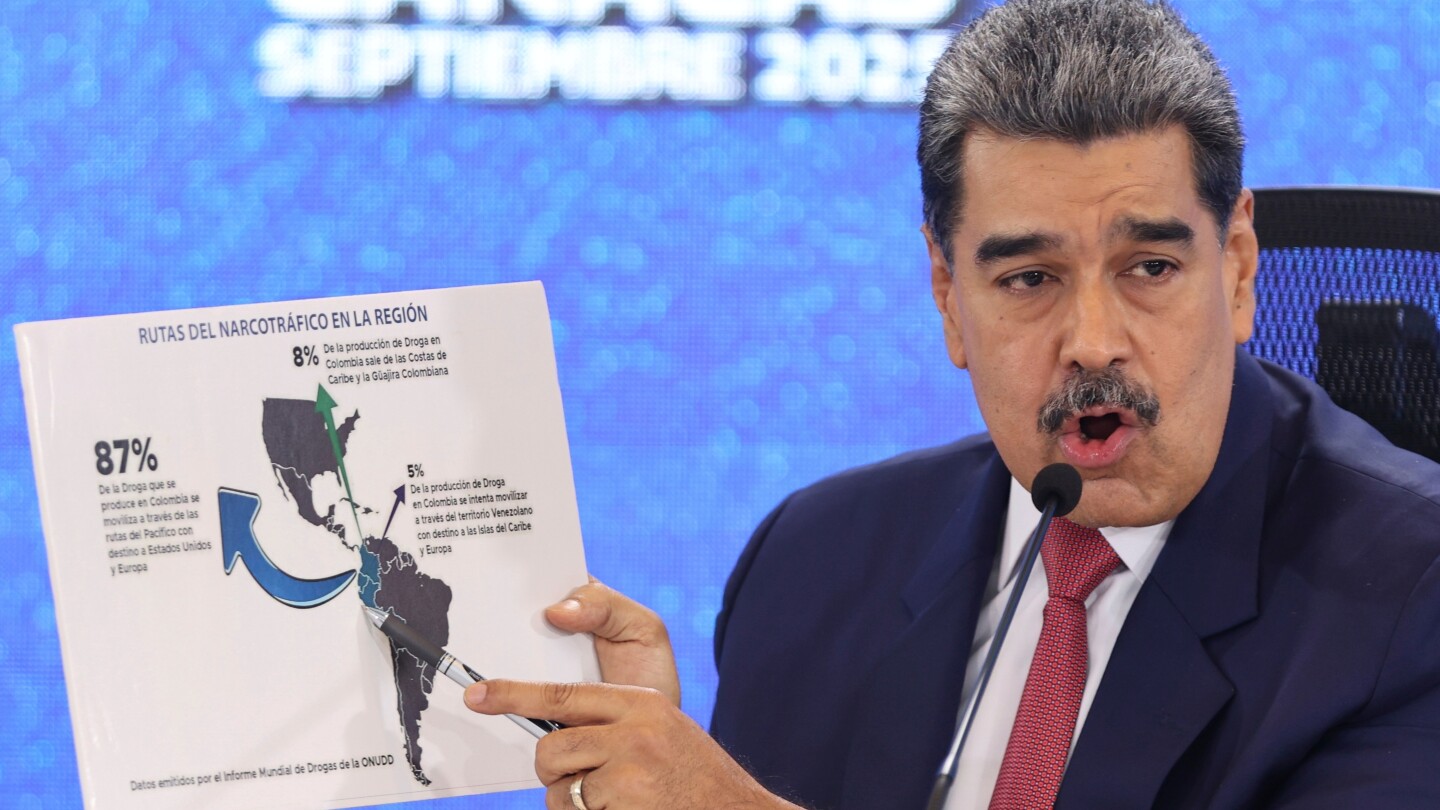Venezuela’s President Nicolás Maduro has ignited a fiery debate, accusing the United States of ‘fabricating’ a war against his nation. This accusation comes as the USS Gerald R. Ford, one of the world’s largest warships, approaches Venezuela, further escalating tensions. In a parallel move, Maduro is seeking to revoke the citizenship of opposition leader Leopoldo López, adding another layer of complexity to the already fraught political landscape.
The implications of these events are far-reaching, potentially destabilizing the region and impacting international relations. With the U.S. and Venezuela at odds, and internal political turmoil brewing, understanding the nuances of this situation is crucial for anyone following global affairs. This article delves into the details of Maduro’s claims, the U.S. response, and the broader context of Venezuela’s political struggles.
Maduro Claims US ‘Fabricating’ War
In a national broadcast, Nicolás Maduro stated that the Trump administration is ‘fabricating a new eternal war’ as the USS Gerald R. Ford moves closer to Venezuelan waters. This warship, capable of hosting up to 90 aircraft and attack helicopters, symbolizes a significant show of force. Maduro’s comments reflect a deep-seated distrust of U.S. intentions, framing the situation as a deliberate attempt to destabilize his government.
He further stated, ‘They promised they would never again get involved in a war, and they are fabricating a war that we will avoid.’ This statement highlights Maduro’s attempt to position himself as a peacemaker, contrasting his approach with what he perceives as U.S. aggression. However, critics argue that Maduro’s claims are a deflection tactic to distract from internal issues and consolidate power.
The Venezuelan president also addressed the pressure he feels from the U.S. government as he initiated legal proceedings to revoke the citizenship of opposition politician Leopoldo López, accusing him of calling for a military invasion of Venezuela.
Citizenship Revocation Attempt: Targeting Leopoldo López
Adding fuel to the fire, Maduro is pursuing legal avenues to revoke the citizenship of Leopoldo López, a prominent opposition figure exiled in Spain since 2020. López has been a vocal critic of Maduro’s regime and has publicly supported the deployment of U.S. ships in the Caribbean, a move seen by Maduro as a direct call for intervention.
The attempt to strip López of his citizenship is viewed by many as a politically motivated act, aimed at silencing dissent and weakening the opposition. Venezuelan Vice President Delcy Rodríguez stated that López’s passport would be revoked immediately, accusing him of promoting ‘economic blockage’ and calling for the ‘mass murder of Venezuelans in complicity with enemy and foreign governments.’
López himself has dismissed the move, stating that according to the Constitution, no Venezuelan born in Venezuela can have their nationality revoked. He has also reiterated his support for U.S. military actions in the country, further intensifying the conflict between him and Maduro’s government.
US-Venezuela Tensions: A Historical Overview
The current tensions between the U.S. and Venezuela are not isolated incidents but rather the culmination of a long and complex history. The relationship between the two countries has been strained for decades, marked by political disagreements, economic sanctions, and accusations of interference in each other’s affairs.
Under the Trump administration, the U.S. adopted a hard-line stance against Maduro’s government, imposing sanctions and recognizing opposition leader Juan Guaidó as the interim president. These actions were aimed at pressuring Maduro to step down and allow for free and fair elections. However, Maduro has remained in power, accusing the U.S. of trying to orchestrate a coup.
The presence of the USS Gerald R. Ford near Venezuelan waters is seen by many as a continuation of this pressure campaign. While the U.S. maintains that its military deployments in the region are part of routine exercises and counter-narcotics operations, Maduro views them as a direct threat to Venezuela’s sovereignty.
Drug Trafficking Allegations and US Military Actions
One of the key justifications for U.S. military presence in the Caribbean is the fight against drug trafficking. American forces have been involved in several operations off the Venezuelan coast, targeting boats allegedly involved in smuggling drugs into the United States. These actions have resulted in casualties, further escalating tensions between the two countries.
Maduro has vehemently denied these allegations, claiming that Venezuela is not a major producer of cocaine and accusing the U.S. of using drug trafficking as a pretext for intervention. However, U.S. officials maintain that Venezuela has become a transit point for drug cartels, and that Maduro’s government is complicit in the trade.
The situation is complicated by the presence of criminal organizations like Tren de Aragua, which has been accused of various illicit activities, including drug trafficking, extortion, and human smuggling. While Maduro denies any connection to these groups, critics argue that his government has allowed them to operate with impunity, contributing to the overall instability in the region.
Conclusion: Implications and Future Outlook
The escalating tensions between Venezuela and the United States, coupled with internal political strife, paint a concerning picture for the region. Maduro’s accusations of U.S. war fabrication and attempts to silence opposition figures like Leopoldo López underscore the fragility of Venezuela’s political landscape.
The presence of the USS Gerald R. Ford near Venezuelan waters serves as a stark reminder of the power dynamics at play, while allegations of drug trafficking and the involvement of criminal organizations add further complexity to the situation. As the U.S. and Venezuela remain at odds, the potential for further destabilization in the region looms large.
Moving forward, it is crucial for international actors to engage in diplomatic efforts to de-escalate tensions and promote peaceful resolutions. The future of Venezuela and its relationship with the U.S. will depend on the ability of both sides to find common ground and address the underlying issues that continue to fuel conflict and division.

Leave a Reply